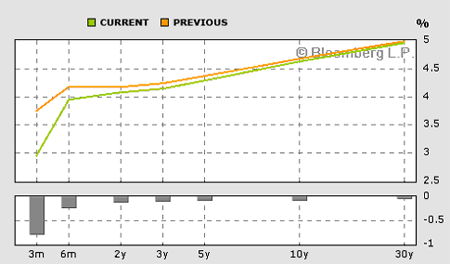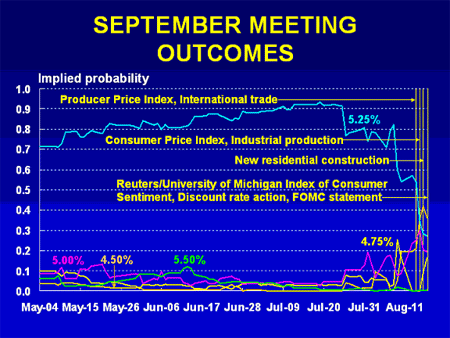Get the latest financial news, insights and expert analysis from our award-winning MoneyWeek team, to help you understand what really matters when it comes to your finances.
You are now subscribed
Your newsletter sign-up was successful
Want to add more newsletters?
I cannot help but laugh the latest economic headline: "Index Suggests U.S. Economic Expansion":
"A gauge of future economic activity inched up in July, a research group said Monday, indicating economic growth may pick up slightly in coming months despite turmoil in the housing market.
"The Conference Board's index of leading economic indicators rose 0.4% in July, as analysts were expecting
Try 6 free issues of MoneyWeek today
Get unparalleled financial insight, analysis and expert opinion you can profit from.

Sign up to Money Morning
Don't miss the latest investment and personal finances news, market analysis, plus money-saving tips with our free twice-daily newsletter
Don't miss the latest investment and personal finances news, market analysis, plus money-saving tips with our free twice-daily newsletter
"Over the past few months, the rise and fall of the index reflects the yo-yo situation in terms of the overall economy,' said Brian Bethune, an economist with Global Insight.
"July's uptick was driven by the employment market and high consumer expectations, he said
"Monday's upbeat report follows the Federal Reserve's decision Friday to cut its key discount rate by a half percentage point, a dramatic move meant to stabilize financial markets pummeled by a rapidly spreading credit crisis.
"In a statement explaining the action, the central bank said that while incoming data suggest the economy is continuing to expand at a moderate pace, the downside risks to growth have increased appreciably.'
"The Fed said it was monitoring the situation and is prepared to act as needed to mitigate the adverse effects on the economy arising from the disruptions in financial markets.'
"The credit crunch started with rising defaults in subprime mortgages home loans made to people with weak credit histories. Analysts believe these problems, along with declining consumer confidence, could lead to a recession."
Rising Components
Consumer expectations
Vendor performance
Unemployment claims
Real money supply
Stock prices
Manufacturers' orders for consumer goods and materials.
Falling Components
Housing permits
Manufacturers' new orders for non-defense capital goods
Interest rate spread.
Neutral Component
Weekly manufacturing.
That data are for July, but they are just being presented now. In the past month, stock prices have fallen like a lead balloon, as have yields on the short end of the yield curve. Of course, one could subscribe and get these reports quicker, but that would not have changed the prediction of economic expansion any.
Besides, the stock market is no more of a leading indicator now than it was back in 2000 or, for that matter, anytime in between. See "Leading Economic Indicators" for more discussion of leading indicators that simply do not lead.
Consumer sentiment is an interesting indicator. There are several measures of 'consumer sentiment': the consumer confidence index, the University of Michigan index, and recent national polls.
In "Consumer Sentiment vs. Gasoline Prices," I showed a stunning inverse correlation between gasoline prices and the University of Michigan index. Gasoline prices have been dropping, and that has a tendency to make some consumers feel better.
But a recent Wall Street Journal /NBC News poll shows "America's Economic Mood: Gloomy": 'More than two-thirds of Americans believe the U.S. economy is either in recession now or will be in the next year.' If that number is even in the ballpark (and I'm sure it is), the Conference Board has consumer sentiment in the wrong column.
A second problem is that consumer confidence is not a leading indicator, either (it is closer to being a coincident indicator if, indeed, it indicates anything at all).
And a third problem is, obviously, the reporting delay.
The Yield Curve
The yield curve is, indeed, signaling something, and that something begins with 'R':

The yield on the three-month T-bill is currently sitting at 2.96, and the six-month T-bill is 3.94. That's a lot of rate cuts priced in.
Speaking of rate cuts, check out the September Meeting Implied Probability:

One thing that is a leading indicator, and is not even on the Conference Board's list of leading indicators, is corporate bond credit spreads. They are blowing out so fast that it caused the complete collapse and bankruptcy of Sentinel. See "Duration Mismatch to Bankruptcy (in One Week Flat)" for more details.
I also see that one of the reasons given for the rosy outlook was based on jobs. This too is amazing, for multiple reasons. For starters, unemployment claims are ticking up as the Aug. 20 report of weekly claims shows:
"In the week ending Aug. 11, the advance figure for seasonally adjusted initial claims was 322,000, an increase of 6,000 from the previous week's unrevised figure of 316,000. The four-week moving average was 312,500, an increase of 4,750 from the previous week's unrevised average of 307,750."
But more to the point, housing is still anemic; corporate capital spending is not robust; there is overcapacity literally everywhere; and certainly, businesses are not going to be expanding in the face of a credit crunch. The unemployment rate has only one way to go from here, and that is up.
For more on jobs, please see "Employment on Pluto Rises."
All things considered, it's a fool's mission to try to predict economic activity three months into the future based on data that are already one month old. It's even more foolish when many of the leading indicators chosen have no history of actually leading anything, while other indicators that do lead are left out. I hope no one takes the economic headlines seriously.
By Mike Shedlock for Whiskey and Gunpowder
Whiskey & Gunpowder is a free, twice-per-week, e-mail service for more from the team, go to https://www.whiskeyandgunpowder.com
Get the latest financial news, insights and expert analysis from our award-winning MoneyWeek team, to help you understand what really matters when it comes to your finances.
MoneyWeek is written by a team of experienced and award-winning journalists, plus expert columnists. As well as daily digital news and features, MoneyWeek also publishes a weekly magazine, covering investing and personal finance. From share tips, pensions, gold to practical investment tips - we provide a round-up to help you make money and keep it.
-
 What do rising oil prices mean for you?
What do rising oil prices mean for you?As conflict in the Middle East sparks an increase in the price of oil, will you see petrol and energy bills go up?
-
 Rachel Reeves's Spring Statement – live analysis and commentary
Rachel Reeves's Spring Statement – live analysis and commentaryChancellor Rachel Reeves will deliver her Spring Statement on 3 March. What can we expect in the speech?

